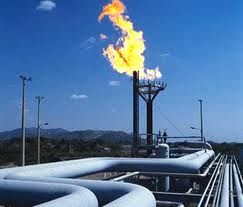
Russia's state-controlled gas monopoly Gazprom said Monday that it hopes to clinch a multibillion dollar deal with China by year-end to become the largest supplier of natural
gas to the world's biggest energy consumer.
Last week, Chinese and Russian leaders failed to reach a price agreement for the long-awaited deal, which would guarantee annual supplies of 68 billion cubic meters of gas to China for 30 years, starting from 2015. Moscow wanted to link the price to oil prices the way it does in Europe, but China considers any European-level price too high.
Gazprom expects prices for its supplies to Europe to reach $500 per 1,000 cubic meters by the year's end, twice as much as China reportedly was ready to pay. At Gazprom's price, the deal will have cost China more than $1 trillion by 2045.
Despite the price arguments, Gazprom deputy CEO Alexander Medvedev said the chances for an agreement before 2012 were "very good."
"The talks are going on uneasily, but we have an understanding," he told journalists. "There are very good chances to reach an agreement by the year's end."
He said that China's annual consumption will rise from this year's 107 billion cubic meters to some 400 billion cubic meters in 2020, and even if China boosts domestic production of gas, there still will be huge demand for Russian exports.
"We have the capability to become their main supplier," he said.
After signing the deal, Gazprom will start building two pipelines that will pump gas from Siberia, Russia's Far East and Sakhalin Island from 2015, Medvedev said.
Europe remains Russia's largest export market for gas and oil, but both Moscow and Beijing have been seeking to diversify their energy sources and markets, despite a long history of mutual suspicion and tensions.
Beijing has already secured deals to pump gas from ex-Soviet Turkmenistan, Kazakhstan and Uzbekistan via a Chinese-funded pipeline, undermining Gazprom's monopoly on exports from Central Asia. It also gets liquefied natural gas from Australia and Yemen.
Past energy negotiations between China and Russia often have snagged on disagreements over prices, loan terms and other issues, including Beijing's desire for equity stakes in Russian resources.
Like China's own state-run companies, Russia balks at ceding any control over what it views as strategically vital assets.
Gazprom is the world's largest producer of gas, but it has been hard hit by sliding demand for gas while competing liquefied natural gas carried by ship flooded European markets. Gazprom relies on pipelines and long-term pricing agreements.
Still, economic recovery has helped Gazprom's sales _ revenues from gas exports to Europe rose by $1.37 billion last year, reaching $43.87, according to Medvedev.
China, meanwhile, has become the world's largest energy consumer, overtaking the U.S. in 2009.
Russian environmentalists warned that one of the China-bound pipelines will bypass the Altai mountains in southern Siberia, where snow leopards and other endangered species live. Scientists estimate as few as 3,500 snow leopards may remain in the wild.
Source: Associated Press
We use cookies to improve your experience. By continuing to use our site, you accept our Cookies, Privacy Policy,Terms and Conditions. Close X